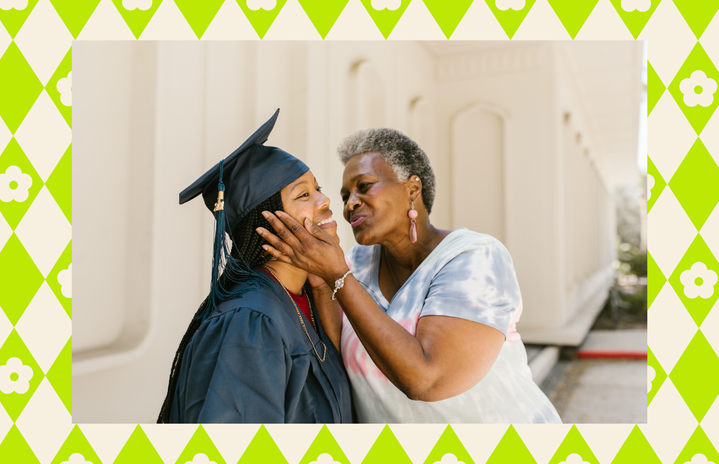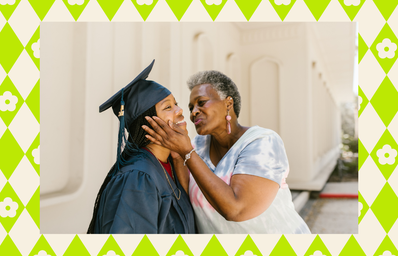After the overturning of Roe v. Wade, women have been forced to confront the possibilities of becoming mothers. Roe v. Wade used to act as a safety net; if a woman got pregnant accidentally or under harmful circumstances, such as rape or incest, women had the option to abort the baby. Now, abortion rights are under fire in 28 states, which minimizes the flexibility women have when deciding whether they want or are ready to become mothers.
Motherhood has been a complex issue for women prior to Roe, though. Moms have recently taken to social media platforms, such as TikTok and Instagram, to express their frustrations with mothering. On TikTok, the “motherhood” search stream is flooded by mothers’ tears, cries for support, and identity crises. Much of this anguish stems from the concept of the “ideal mother”. The “ideal mother” is an ambitious woman who effortlessly takes care of the kids, manages the household chores, provides for her husband–all with a smile on her face. This fictitious, unattainable role stigmatizes mothers’ mental health due to the pressure it puts on women to be perfect. Mothers feel like they are unable to be unhappy with their children or overwhelmed with the responsibilities motherhood entails without looking like a “bad mother.”
The incessant stress of being a good mother consumes women’s identities. Women become so fixated on making sure the needs of their children are met that they begin to neglect their personal wellbeing, goals, and hobbies. “…Motherhood should be called ‘otherhood’—the relentless caring for others and not the self,” writes Leslie J. Davis, a parenting expert, in her Washington Post article. Once they possess a child, women are merely seen as extensions of their children. The “ideal mother” ideology expects mothers to be available for their child under any and all circumstances, which restricts women from having time to socialize or be independent. Going out with friends, finding time to exercise, having date nights with their romantic partners, and even showering alone becomes virtually impossible once a child enters a woman’s life.
Rachel Bersate, a mom of two, mourns the person she lost when she birthed her children: “I get nostalgic for the woman who took vacations to exotic countries or went out to dinner with friends at a moment’s notice.” This loss of freedom and adult socialization causes women to become codependent on their children. They spend so much time taking care of their children that they forget who they are apart from their family, which leads to feelings of loneliness, suffocation, and detachment from the self.
Not only can women lose sight of themselves after becoming mothers, but society also only recognizes them for their parenting role, too. Women are often pushed out of the workforce and are domesticated once they become mothers. According to Forbes, women are more likely to switch to a flexible or remote job after having a child. However, the leniency of these jobs makes women victims of the “Motherhood Penalty”. Once women become mothers, their pay decreases, which makes it increasingly more difficult to afford daycares or sitters. Thus, many women become stay-at-home moms (SAHM) to eradicate childcare expenses.
Fathers, however, are not expected to leave the workforce in order to support their children. When asked to compare the responsibilities of mothers and fathers, CU Boulder’s Professor Lara Jacobs, MFA said, “But one of the things that happens when you have a baby is it becomes very clear of what the father can do and what the mother must do…there can be a sense of freedom for father.” A crucial facet of the “ideal mother” ideology is that motherhood is inherent to womanhood; it is presumed all women want to and should be mothers. Fathers do not share this societal expectation. The traditional nuclear family, in which men are the primary breadwinner for a household, only expects men to go to work. Men are given the choice to be involved in their children’s lives, whereas women are shamed if they choose their career over their family.
By restricting women of choice, society forces mothers to carry the emotional burden of familial labor. Most mothers are the primary emergency contact for their children. Most mothers organize and keep track of their children’s extracurricular activities. Most mothers are in charge of meals, laundry, and cleaning in their household. Mothers single-handedly oversee the functioning of their family dynamic, which may cause them to become overwhelmed and fatigued.
Unlike a typical nine to five job, breaks and co-workers are not granted in motherhood. Mothers, especially those who stay-at-home, are unable to walk away from their child’s needs; it goes against their DNA. The University of Pennsylvania says, “Because women are biologically programmed to be mothers, men, who have no such instinct, are free to choose whether or not to engage in childrearing and nurturing since the responsibility is not theirs to bear.” When fathers go to the office, they are given space away from their children, which makes it easier to handle toddler tantrums and teenage attitudes. Mothers aren’t given the same opportunities, though. Taking care of a child means ensuring they are fed, bathed, and loved. Neglect and incompetence is not an option in motherhood, or else the child will suffer. At a typical job, tasks are also delegated between teams to prevent burnout and guarantee quality work is performed. Mothers are often left to manage the responsibilities of caretaking independently. This lack of support causes women to resent their husbands and children, as a woman often feels isolated and abandoned by her own family.
When women’s identities are diluted to mothers, it sends the message to young girls that their primary role as women is to take care of people
This motherhood model also disrupts family dynamics by setting bad examples for children. While reflecting on how her daughter only sees her as a mother and not as a person, Bersate notes, “She’s probably already internalized the idea that her mother only works, cleans and takes care of others, and one day that idea will inform how she acts in her own life.” When women’s identities are diluted to mothers, it sends the message to young girls that their primary role as women is to take care of people. This prevents future generations from having the freedom of choice in their future, as they subliminally feel the societal pressures to become mothers.
Luckily, Lara Jacobs has hope. “Women, especially of [Gen Z], are challenging the sense that whether or not I have children, that doesn’t make me any less of a woman,” Jacobs pridefully says. However, this does not mean that women have achieved independence from motherhood in society. Women need to hold on to their personal identities when they become mothers to empower themselves, their children, and womankind. Or if a woman knows she does not want kids, she should not feel pressured to the expectations imposed on her by society.
Women are people, not just baby-makers. It’s about time the world starts respecting that.


